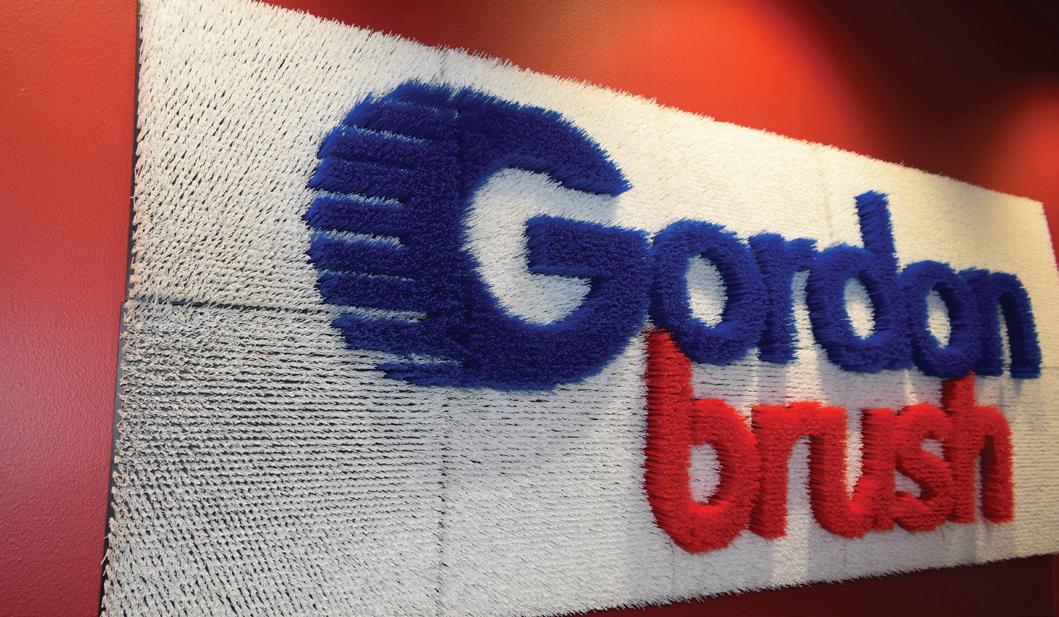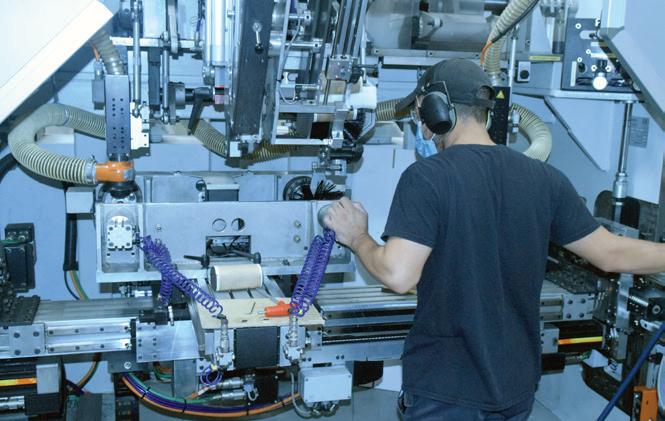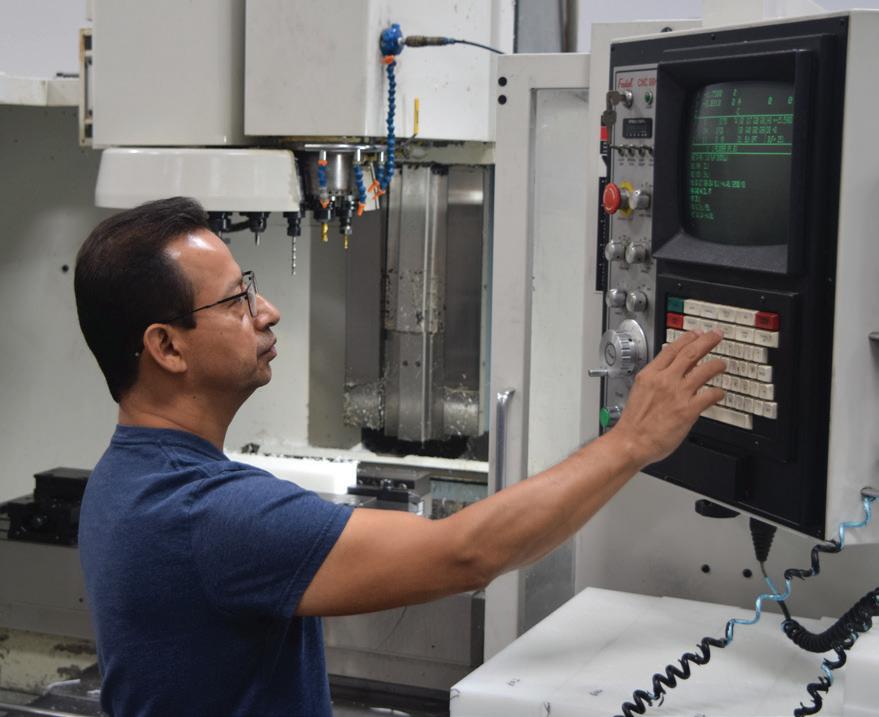
13 minute read
Ken Rakusin: Acquisition Man By Bob Lawrence
KEN RAKUSIN: ACQUISITION MAN
A decade ago, Gordon Brush Mfg. Company President and CEO Ken Rakusin told Brushware that Gordon’s goal was to become “a dominant player in the brush industry…” En route to achieving that objective, the manufacturer of specialty and custom industrial brushes, based out of City of Industry, Calif., has acquired a dozen brand-name companies that have complemented or diversified Gordon’s product offerings. In totality, these brands under the Gordon umbrella manufacture more than 17,000 standard, specialty and custom brooms and brushes for industrial and commercial applications. That Rakusin would even become a player in the brush industry was far removed from the career path he was on 30 years ago at Xerox in Los Angeles. However, he was looking for a change because he loved LA and loathed the idea of being re-assigned to Xerox headquarters in Rochester, N.Y. Thus, in late 1989, after responding to an ad from Gordon Brush seeking a new president and CEO, he was offered the job. Initially, Rakusin declined the offer, thinking the company was “too small” and “financially struggling” with perhaps six months remaining before going out of business. But “they talked me into it, and thank God they did,” he says in reflecting on a decision that eventually would lead to his building one of the brush industry’s largest manufacturing companies.
By Bob Lawrence

Founded in 1951 by Don Gordon and purchased by aerospace engineer William Loitz 22 years later, Gordon Brush didn’t begin making acquisitions until after Rakusin, and Loitz’s son, Bill, bought the business in 1998. The first acquisition occurred the following year when Marx Brush, a manufacturer of artist and cosmetic brushes out of New Jersey, was acquired. Three more acquisitions would follow during the Rakusin/Loitz ownership: in 2005: Milwaukee Dustless Brush (Milwaukee, Wisc.), a janitorial and sanitation brush manufacturer; in 2006: JEK Inc. (Diamond Springs, Calif.), a manufacturer of brushes for the printed circuit board industry; and in 2008: Redtree Industries, Inc. (Newark, N.J.), a paint applicator and paintbrush manufacturer and distributor for the marine and hardware industries. Then in 2010, Rakusin became Gordon’s sole owner, setting the stage for a flurry of buys beginning the following year with Glen Ellyn, Illinoisbased Brush Supply Company, an industrial brush manufacturer. In 2012, he purchased FootMate System, out of Sarasota, Fla., a producer of brush and specially formulated gel for cleaning and massaging feet in the shower or bath.
Time Out
A four-year hiatus in acquisitions then occurred while Gordon built its colossal new corporate headquarters and plant in the City of Industry and relocated from its Commerce, Calif., facility in 2016. This enabled the company to initially relocate Milwaukee Dustless Brush and Redtree Industries into the facility. With one exception, all future acquisitions would relocate there as well. That same year, Rakusin ramped up his buying by acquiring StaticFaction (Salem, Mass.), the exclusive authorized North American distributor of Thunderon anti-static properties, and J.B. Ward (Franklin, N.J.), the largest manufacturer of Thunderon brushes used to control static electricity in the electronics industry. In 2017, he acquired paintbrush manufacturer Kirschner Brush Mfg. Company (Bronx, N.Y.). Easy Reach, Inc., a manufacturer of wash brushes, extension handles, injection and foam molded brush blocks and other janitorial products was purchased the following year. Parker Brush, Inc., (Rocklin, Calif.), manufacturer of brushes for the agriculture, food processing and electronics industries was acquired that same year. Gordon’s most recent purchase came in 2019 with Spectrum Paint Applicator Corp., a Newark, N.J., manufacturer of consumer paint brushes, paint rollers and artist brushes. Also in 2019, the last companies that operated in their own facilities—Parker Brush, Kirschner Brush and Spectrum Paint Applicators—were relocated to the corporate plant. In every case except Easy Reach, the businesses Rakusin acquired had operated from leased buildings, and rather than having a number of leased locations around the country,
Rakusin says it was “logical to move all of them to our new California location because we had enough space to accommodate them. More importantly, we had newer, faster machinery to manufacture their products.” While those relocated are part of Gordon, they continue to maintain their brand names “for now,” Rakusin says. Easy Reach remains in Hattiesburg because, as Gordon’s largest acquisition, “It made the most sense to not only buy the company but to also buy the building, which houses the operation,” Rakusin explains. “Easy Reach is a great company under excellent management and is located in a beautiful 66,000-square-foot facility with room for large increases in business that will occur either organically or perhaps through acquisition.”
How The Acquisitions Occurred
Although eight of the 12 acquisitions occurred during Rakusin’s 10 years of sole ownership, to him, it doesn’t seem like he went on a buying spree. As he explains it, “2010 was a year of many personal changes in my life. Subconsciously, perhaps, I was bored and needed new challenges and something exciting on which to focus!” He says that in the beginning, the many acquisitions made proved challenging to himself and the staff. “Once we figured out how to do it in a way that was best for our employees, customers and vendors, I took advantage of most of the opportunities that were presented,” he says. “There were a few that got away, but they must not have been right for me, otherwise I would have figured out how to get them.”
Each potential buy was either brought to Rakusin’s attention by the owner, an intermediary or a broker because he never sought out a company to purchase. “Most, but not all of them, had severe financial situations and the owner wanted or needed out. Often times, the owners were dealing for decades with the stress of wondering how they were going to make payroll and pay their vendors.” He says the owners were relieved to have someone take over their business and help their legacies continue. “In other cases, the viable and successful businesses we acquired were sold at healthy premiums, as their businesses were worth it,” he says.
Valuing The American Brush Manufacturers Association (ABMA)
Rakusin says attending ABMA conventions and being involved in the association, including serving on the board of directors for 16 years, directly and indirectly, led to the acquisition of eight of the companies. Serving as its president, 2005-2007, and a member for 30 years, he’s been a “fanatical proponent of ABMA membership and attendance.” That he would become an integral part of the association was unforeseen when he joined Gordon, an ABMA member that had never sent a representative to its conventions until he decided to attend one in Scottsdale, Ariz., in March 1990, just

Plant manager Ricardo Ruiz with Ken Rakusin

Machine operator Kevin Garcia inspecting the brush dimensions

Kevin Garcia observing that the machine program is staple setting the bristles properly
six weeks after his employment began and even though he worried whether the financially-troubled company could even afford the air travel, hotel and his taking time off to attend. As he recalls, “I was afraid to go because I was naive and didn’t know anything about the industry or anyone in it. What I saw there were very powerful and impressive people. I was wowed by all the knowledgeable people I met, and the networking opportunities were like nothing I could ever have imagined.”
Early in his ascendency in the association, he became disgruntled with the prior management firm’s inactivity to adhere to the board’s directives while it annually sought massive fee increases. Investigating, he discovered that ABMA “could save tens of thousands of dollars, become more efficient and get things done to benefit the membership.” As a result, former member David Parr won the bid to take over the association as executive director, “leading to its solvency and growth.”
Rakusin believes his involvement, which led to the majority of his acquisitions, is proof of one of the potential benefits of being a participating member. “As I reflect over time, I did not plan on buying these businesses; the deals just continued to fall into place,” he says. He explains that the first acquisition, Marx Brush, not just because we had the only happened because he ability to buy them, but also because they were able to was in the New York metro area for a couple of days before he went to Chicago see the longevity and high for an ABMA board meeting. standards of our company.” “While in town, I visited 10- 12 brush companies, met people whom I did not know and bought Marx,” he says. “Nothing was planned, but if not for the ABMA board meeting, I would have flown home with my family and missed the opportunity.” Rakusin adds that the only reason he purchased Marx was because it was “a great deal.” He says it turned out to be an amazing acquisition because of the timing, as it was purchased a couple of years before a significant recession dampened the United States economy. “The Marx business, as well as subsequent products that we made for its customers, generated a significant amount of revenue for Gordon,” Rakusin says. “This helped to rapidly pull us out of the effects of the recession.”
Rakusin’s connections within the association led to other acquisitions including Easy Reach, which two ABMA vendor friends told him about, one saying it was for sale, the other telling him about its “excellent management team.” Longtime relationships forged through the association have also created opportunities for Gordon’s growth. When StaticFaction’s Ian Moss, a Rakusin friend for nearly 30 years, and Ed Boscia of J. B. Ward, a friend for 25 plus years, were ready to sell their successful companies, Rakusin was ready to buy. The deal with StaticFaction actually occurred at an ABMA meeting in St. Petersburg, Fla., while he and Moss were sitting in chairs on the front lawn of the Renaissance Vinoy. “Once again, the value of my involvement with the ABMA cannot be understated,” Rakusin says.
Why Others Sold And Why Gordon Bought
“The main reasons that companies have sold their businesses to us is because the owners have wanted to retire and eliminate all the normal business issues including personnel, finances and the investments required to remain on the leading edge and competitive,” Rakusin says. “At Gordon Brush, we are always looking to make investments in acquisitions and machinery.” He says the company is well-capitalized and knows that personnel issues are solvable. “I also believe that the owners sought out working with Gordon Brush not just because we had the ability to buy them, but also because they were able to see the longevity and high standards of our company. I feel honored that they entrusted us to continue the legacy they had built,” he says. Rakusin adds that Gordon Brush has a proven track record of acquiring businesses and maintaining all the good things they were doing on their own and then improving. “Over my 30 years in the business, I have never sold anything, only acquired other companies,” Rakusin says. “My heart is in building and running an American brush manufacturing business, not as an investor where I’m looking to increase my profits by going overseas, but by maintaining the quality and standards of American manufactured products, as well as keeping jobs here in America.” He says that by making large investments in machinery, Gordon Brush is able to make products better and faster. “I can assure you that we have been able to craft even better-quality products than the prior provider,” he says.
Asked if any of Gordon’s other company purchases were of a similar nature to J.B. Ward and StaticFaction in that they were acquired to complement each other, Rakusin replies that “purchasing Marx in 1999 propelled Gordon Brush into the artist brush business and buying Redtree in 2008 moved us into the paint applicator business.” The Kirschner and Spectrum acquisitions created synergy for the artist and paintbrush manufacturing. “We have become more skilled at making both types of product lines, as our volume is now much greater,” he says. “Acquiring JEK, Brush Supply, J. B. Ward and Parker Brush have all improved the custom brush portion of our business, which integrates very nicely with the custom work we already produce at Gordon Brush.”
When exploring a company for potential acquisition, Rakusin begins by looking at its brand, product line, how long it’s been in business and its perceived reputation. “I then spend a significant amount of time understanding their financial position. I’m always open-minded when I first learn about a company, but as I explore the details, there are times when I have decided to pass on the acquisition for a variety of reasons. Sometimes the timing isn’t right, the seller might want a premium that is too high or perhaps I can’t see a road to profitability. Having stated these things, I still try my best to make a deal that will be a win-win.”

Congressional Recognition Award for manufacturing in America

CNC machine operator Juan Mendez setting up the CNC machine to make parts
An “American Made” Champion
Paramount in Rakusin’s promotion of the Gordon companies is his strong belief that the US should manufacture products for home consumption on its own soil. As he puts it, “We are determined to build and grow our business in the United States.” This is opposite of the thinking of droves of companies that years ago abandoned America for cheap labor offshore. In explaining his philosophy. Rakusin says, “Without getting too political, I have always valued making products in America.” He explains that his companies are financially successful, and he values the employees, many having worked for Gordon for 30-40, or more, years. “These team members have given their lives to helping Gordon Brush grow and become successful. I make a reasonable amount of money, and being selfless, I enjoy doing things for others, whether it is for my employees, personal friends, other ABMA member suppliers or other brush companies,” he says. He says that making more money at the expense of terminating the workforce is not something he would ever be willing to do. “Having an extensive inventory and making things in the USA also allows us to be nimble and supply our customers quickly, especially compared to Asia,” he says. “I am proud that over my 30 years in the business, Gordon Brush has been able to have dramatic success AND still manufacture almost everything here in California.”
He also says that as the demand for American-made products increases, “Gordon is proud to be at the forefront of that movement,” an indication that Rakusin believes demand for American-made products will spark a return of manufacturing to the US. “In my opinion,” Rakusin says, “I hope that our experience with COVID-19 and our inability to source critical PPE here in the US have shown the value of American-made products and will lead the effort to move more manufacturing back to the United States.” He says that whether or not it happens, Gordon Brush will continue to invest in machinery so it can continue to grow the business domestically.
A Dominant Player?
In the opening paragraph of this article, Rakusin was quoted as stating that Gordon’s goal was to become “a dominant player in the brush industry…” Asked if his company is there yet, Rakusin replies, “Gordon Brush will never be where we want to be as the bar keeps getting higher. Warren Buffett was the wealthiest person in the world, then along came Bill Gates, Bernard Arnault and now it’s Jeff Bezos. One learns over time that we are always in between. No matter how successful one becomes, there is always someone/something doing better. However, we will keep marching forward. We are proud of what we have achieved compared to where we have come from. I look forward to seeing what lies ahead.”
Given that the latest of the continuous string of acquisitions, Parker Brush, Inc. and Spectrum Paint Applicator Corp., occurred in 2019, Brushware wanted to know whether another acquisition announcement might come before the end of this year. Rakusin’s reply: “This is a tough question to answer because I’ve learned to never pre-announce what might happen. Let me close by stating that anything is possible as we continue to look for growth.”
–brm



